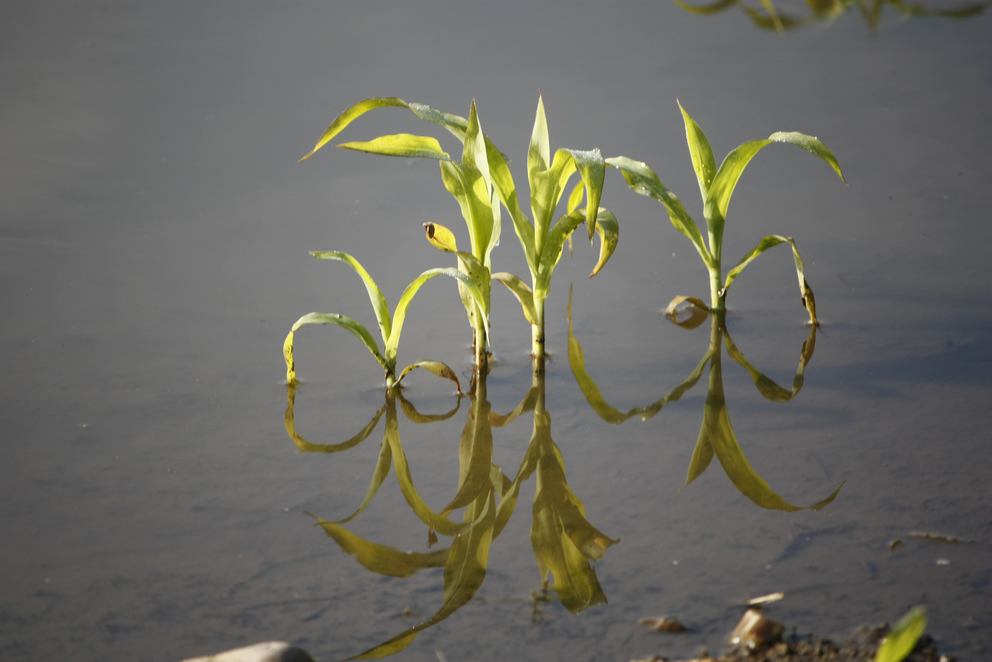At the conference of the International Society for Plant Anaerobiosis (ISPA) an international team of scientists will exchange current research results about plants’ reactions to flooding stress. The conference is co-organized by CIBSS researcher Jun.-Prof. Dr. Sjon Hartman and co-sponsored by the Cluster of Excellence CIBSS – Centre for Integrative Biological Signalling Studies at the University of Freiburg.


Plants under flooding stress
International scientific conference in Germany for the first time

Maize plants under waterlogging.
Image: Ole Pedersen
As a result of climate change, the frequency of heavy rainfall and flooding events is increasing. Many researchers around the world are investigating how plants react to this type of stress. They have joined forces in the ISPA. This year, for the first time, the ISPA conference is being organized in Germany. Under the lead management of Bayreuth plant geneticist Prof. Dr. Angelika Mustroph, about 100 participants will exchange current research results from September 25th to 29th in the monastery Banz / Bad Staffelstein. The meeting is organized together with several research teams, including Junior Professor Dr. Sjon Hartmanfrom CIBSS.
"Research on stress responses of plants is highly relevant internationally today because flooding of fields – whether as a result of heavy rainfall or rising sea levels – poses a major threat to agricultural crops. In recent years, scientists at the University of Bayreuth have contributed to new discoveries in this field, especially with regard to signal transduction in plants that suffer stress during flooding. Other groups made progress in breeding new stress-resistant varieties, especially of rice", explains Mustroph, who is leading the meeting together with research teams from Bielefeld (Prof. Dr. Romy Schmidt-Schippers), Freiburg (Jun.-Prof. Dr. Sjon Hartman), Aachen (Prof. Dr. Joost van Dongen), Kiel (Prof. Dr. Margret Sauter) and Munich (Prof. Dr. Peter Geigenberger).
The members of the ISPA investigate the reactions of plants to flooding and oxygen deficiency from the perspective of different scientific disciplines: Molecular biology, biochemistry, anatomy, ecology, and agricultural science are interlinked in numerous research projects. The topics include gene expression and fermentation metabolism in stressed plants, anatomical aspects such as the formation of "aeration tissue" (aerenchyma formation), the survival strategies of flood-tolerant wild plants, and the breeding of more tolerant crop plants.
This year’s meeting will mark the 14th conference of the ISPA and the first time it is being hosted in Germany.. Previous conferences were held in Taipei (Taiwan, 2019), Copenhagen (Denmark, 2016), Los Banos (Philippines, 2013), Volterra (Italy, 2010) and Matsushima (Japan, 2007). Once again, numerous internationally outstanding scientists have been recruited as speakers for the upcoming conference, including Prof. Dr. Julia Bailey-Serres (University of California Riverside, USA) and Prof. Dr. Michael Holdsworth (University of Nottingham, UK). Nobel Laureate Prof. Sir Peter Ratcliffe (University of Oxford, UK, Nobel Prize in Physiology or Medicine 2019) will deliver the opening lecture on "Oxygen perception and signal transduction."
Science Funding:
This year's ISPA conference is funded by the German Research Foundation (DFG) and the German Botanical Society (DBG).
More information about the conference:https://www.uni-bielefeld.de/fakultaeten/biologie/forschung/veranstaltungen/ispa22-anaerobiosis/



